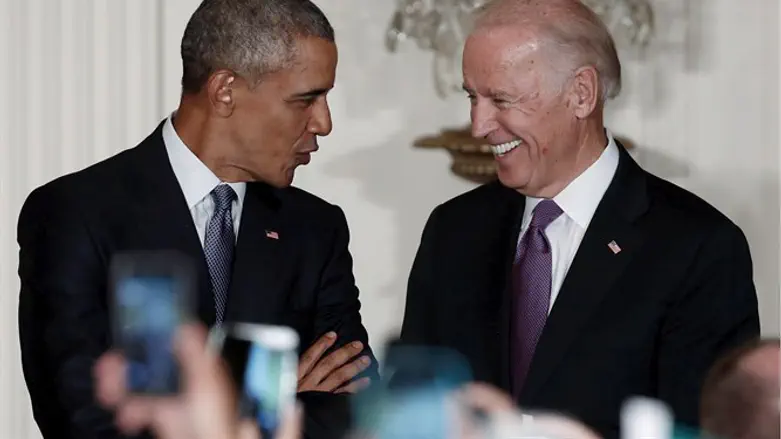
(JNS) The most important reactions to the assassination of Iran’s top nuclear scientist Mohsen Fakhrizadeh are the ones that we haven’t heard. By that, I’m not referring to any statement from Israel’s government. It, as is to be expected, had nothing to say about the identity of those responsible for putting an end to Fakhrizadeh’s quest to provide his tyrannical Islamist masters with the means for achieving their genocidal ambitions. Nor does it matter that the White House similarly declined to comment about his demise.
Just about everyone assumes that the daring action was the work of Israel’s Mossad, whose record of operating with seeming impunity inside Iran was already the stuff of legend. Indeed, one “American official” told TheNew York Times and two intelligence officials, all speaking off the record, that this was the case. While none of them indicated that the United States had advanced knowledge of the ambush in which he was gunned down, it’s clear that the administration was just fine with an operation that is a fitting sequel to the U.S. missile strike that took out Qassem Soleimani back in January—the head of Iran’s Islamic Revolutionary Guard Corps’ Quds Force, the nation’s state-sponsored terrorist group.
Like the killing of Soleimani, the attack on the man labeled as the mastermind of Iran’s nuclear program after Israel’s equally daring theft of a warehouse full of files about their efforts in 2018 is being criticized by various alumni of the Obama administration. Former CIA director John Brennan called the killing “criminal,” and Ben Rhodes, the former deputy national security advisor who orchestrated the media “echo chamber” promoting false information about the 2015 nuclear deal prior to its adoption, considered it “outrageous.”
But wisely, various other Obama-era veterans—such as Anthony Blinken, who will be nominated to be the next secretary of state—about to take office in a Biden administration have held their tongues, though the temptation to lash out at their old bête noire, Israeli Prime Minister Benjamin Netanyahu, must have been great.
That’s all to the good. Denunciations of the supposed Israeli move are, like those criticizing the Trump administration’s withdrawal from the disastrous nuclear deal or his “maximum pressure” campaign of crippling sanctions that have brought the Iranian economy to its knees, predicated on the same false thesis that led to President Barack Obama’s decision to appease Tehran.
The argument for the pact that enriched and empowered the world’s leading state sponsor of terrorism was that the United States had only two choices when confronting Iran’s attempt to become a nuclear power: appeasement or war. Since the latter was unthinkable, Obama launched a campaign to (in his words) give the ayatollahs a chance to “get right with the world” that they had no intention of taking up. The deal was a signal to both Israel and Sunni Muslims that they were on their own in dealing with Iran’s quest or regional hegemony.
The unintended consequence of this misguided policy was to bring more peace to the Middle East, but not the kind that Obama envisioned. His embrace of Iran pushed the Gulf states, which had been edging towards Israel before this, into the arms of a Jewish state they now saw as a strategic ally against Tehran. The decision of the United Arab Emirates and Bahrain to normalize relations with Israel, as with the Saudis stepping up cooperation, has created a new Middle East reality that is something that Biden’s foreign-policy team can’t ignore, even if it would really like to turn the clock back to the situation that existed when Obama exited the White House in January 2017.
The notion that Israel and the Trump administration are attempting to tie Biden’s hands on Iran has it backwards. It’s not so much that they are fearful of a new U.S.-Iranian rapprochement in 2021 that will foil their desire to confront Tehran. Rather, it’s that they are proceeding on the assumption that the conflict will continue regardless of whatever policies Biden and Blinken attempt to pursue. That means that opportunities to damage Iran’s capabilities must not be shirked, despite the seemingly bad timing of doing so during a presidential transition.
The Iranian regime has already repeatedly demonstrated that its goals are incompatible with those of Western fools, either in the United States or Europe, who think that diplomacy can somehow accommodate its ambitions. Iran’s use of terror, its nuclear ambitions are, like its ruthless and brutal suppression of dissent at home, integral to the identity of the Islamist government. Efforts to appease them like the nuclear pact are unsatisfactory and temporary solutions to a problem that requires a more realistic long-term approach.
It’s equally true that Iran’s leaders have also shown that, despite their bluster, the talk about waging war on Israel or the West is more of a bluff than a credible threat. While that could theoretically change, the talk of so-called experts on Iran about a conflict between “hardliners” and Tehran liberals is, like so much of the analysis of the Soviet Union a generation ago, utterly bogus.
That means that the problem facing Biden is not how to undo Trump’s withdrawal from the nuclear deal or to make a new Middle East where Israel and the Gulf states are working in unison to accept a return of Iran appeasement. Rather, it’s how long it will take his new foreign-policy team to understand that the Obama vision for a housetrained Iran that would do business with the West was never realistic and, even with the support of Europe, Russia and China, can’t be revived. If they’re serious about crafting an Iran policy that is anything more than an Obama nostalgia tour, they must acknowledge that the nuclear deal—whose sunset clauses ensured that Iran would eventually get a bomb and which ignored its terrorism and missile building—must be scrapped sooner or later.
The information about Iran’s nuclear program that Israel published two years ago—showing they never really stopped working for a weapon, along with every act of terrorism and illegal missile-building they commit—contradicts the Obama-Biden hopes for curtailing, let alone ending the threat from the regime.
Former Secretary of State and future Biden climate change tsar John Kerry may have advised Iran to simply wait until a Democratic administration replaced Trump to resume good relations with the West. But even if Tehran is cheered by Trump’s defeat, they aren’t going to conform to Biden’s will any more than they did to Obama’s. Their violent and aggressive goals remain unchanged, and nothing short of the kind of economic isolation that Trump was seeking to impose will force them to change their behavior, if, indeed, even that would suffice.
As important as the transition to a new administration in Washington is, it changes nothing about Iran or its intentions or the responsibility of those who rightly understand the nature of the threat to act. As they showed with the assassination and with its strikes against Iranian targets in Syria, Israel won’t simply sit back and let Iran have its way. The only question about Biden’s policy is whether he will join that fight as Trump did, or if he will stand on the sidelines as the Jewish state continues to do the West’s dirty work.
Jonathan S. Tobin is editor in chief of JNS—Jewish News Syndicate. Follow him on Twitter at: @jonathans_tobin.
